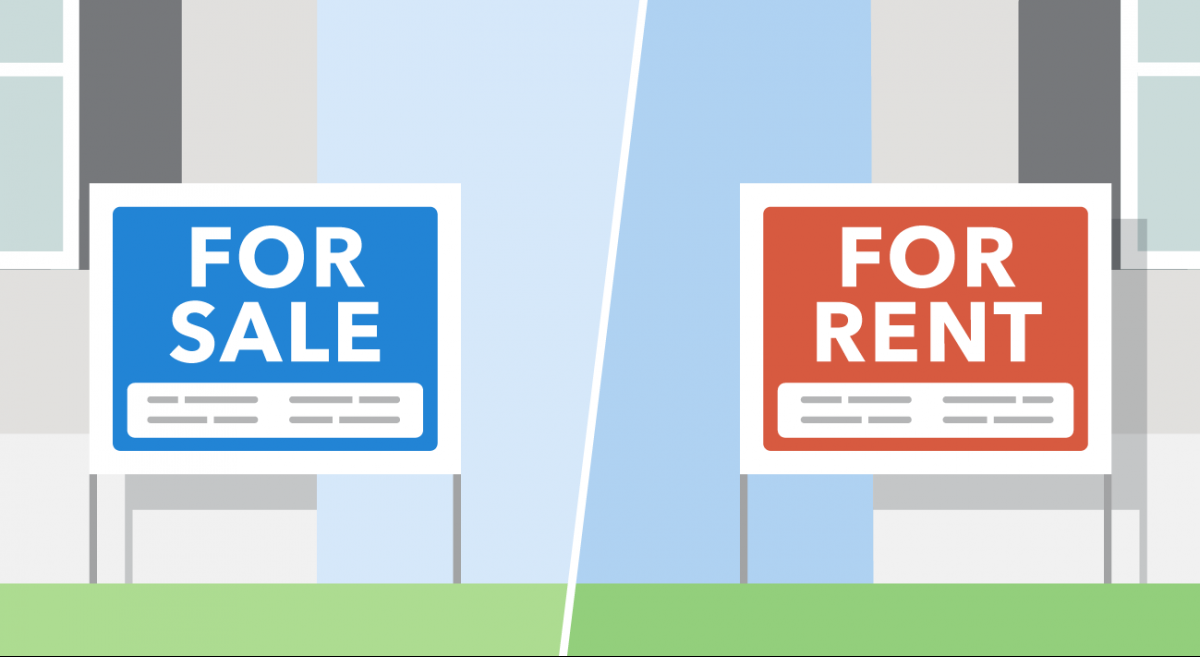Renting vs Buying

The Role of a Real Estate Lawyer
October 18, 2021
Home Appraisal
November 5, 2021Deciding to rent or buy your home is a major decision that affects your life as well as your financial health. Should you buy or rent? There is no definitive answer to this age-old conundrum. Your decision should depend on your personal and financial situation along with the current market trends and economic situation. There are advantages and disadvantages associated with buying a house and renting one. Pros and cons of buying and renting are discussed in this blog, which may help you decide whether to go for buying or renting.
Pros of Buying
Stability
When you own a property, as long as you keep repaying your mortgage, you will be able to live there for as long as you want or need to. There is no reason to leave if you are comfortable and happy. Since the stability in life can be a great asset when it comes to your mental health, being able to know you always have a home to go to and being able to relax completely is a wonderful thing.
Not only can you feel more stable in terms of where you live, but you can also have greater financial stability. Rents can go up, if not every year, then certainly every two or three years. Your mortgage won’t change if you have a fixed rate, and even if it is variable, it will be a much smaller rise than a change in your rent might be. This means you can plan things for the future much more easily.
No Restrictions
Once you purchase a property, you also attain full creative control to alter and modify it. Being a homeowner, you have the complete freedom to knock down the walls to open up your living room and paint the walls to your liking without having to answer to anyone. You can update fixtures, change the decor, fix up the garden and even do major remodeling work to suit your personal style and needs.
However, just make sure to be aware of the bylaws of the town or city you live in before you make any major changes in the layout.
Cons of Buying
Maintenance Costs
Unlike other investments, owning a home comes with ongoing costs. Apart from mortgage repayments, there is also the council tax, and the utilities you will need to pay for any maintenance required. Higher maintenance cost is one of the major drawbacks if you decide to go against renting. You are the responsible for the maintenance of everything in the house.
Whether you are repairing the washing machine or there is a leak in the roof there is no landlord to be called. You are responsible for learning how to fix it yourself or paying a professional do it for you. In a home that has a lot of problems, this can certainly add up.
Less Mobility
Homeowners have less mobility when it comes to being able to move homes than tenants who rents on a short-term basis. A tenant can leave a property after fulfilling the notice period, which is usually one month. However, a homeowner is likely to be dependent on selling their home before being able to buy a new one, and therefore it might take longer to be able to move homes once the decision has been made.
It may take more thought to accept an attractive job offer requiring you to pick up and move to another city.

Pros of Renting
Maintenance Costs
Perhaps we should say there is very little responsibility for maintenance. While you might be expected to maintain your rental as best you can, you are not on the hook for major repairs, like if an appliance breaks or you have a plumbing issue. Your landlord is the one who is responsible for handling these repairs. Though there may be a situation where you are on the hook for it, more often than not, it is not your problem.
Similarly, you do not have to worry about any unexpected expense when it comes to the maintenance of your rental. If you owned a home and your dishwasher died, you would have to shell out a few hundred dollars for replacement. If the dishwasher in your rental dies, your landlord would be the one to replace it, which is no financial burden to you.
Relative Ease of Relocating
A homeowner must first wait until selling his or her home before relocating to another. This might take up to a year or more. Most tenants, however, are only locked into leases of one year. In most cases, they can get out of the lease by giving the landlord a one-month advance notice. This means you have no obligation to stay in any longer than you want to. For people who move around a lot, this is the perfect situation.
Cons of Renting
No Equity Buildup
When a person is renting, he or she is not building up any equity. When a homeowner makes a mortgage payment, he is paying off his loan and adding to the equity that he has in a home. The tenant's monthly rent in most cases is only helping the homeowner build up equity. Even if you rent a home for a decade, you will not own it. When you leave your rental, you do not take anything with yourself. It’s the property owner’s equity that grows, not yours.
Rent is Not Fixed
While rent-stabilized apartments are a thing in certain cities, it’s not a widespread rule among rental homes. Essentially, within reason, your landlord can adjust your price however they see fit. There is a possibility that your neighborhood might have a real estate boom that clues your landlord in to your rent being below market value, so in turn, they raise it the next time they are able.
Moving Expenses
This is probably one of the biggest disadvantages of renting a home. Packing your entire life and moving to a new place is never easy, but the costs associated with the entire thing make it even more difficult. Apart from paying for a moving service, tenants also need to put down the deposit and clear their utility bills. Not to mention, if they relocate to a different area, they might have to change their children’s schools or spend more on transportation.
Conclusion
Needless to say, when it comes to renting vs owning a home, there are pros and cons associated with both. While your financial situation plays a huge part in deciding the right choice for you, it is not always about money. You also need to evaluate your personal goals while deciding if it is better to rent or buy a home and see what could be better for you in the long run. If you know exactly how long you want to stay in your home and where you want to live the decision can be easy. However, before making the final decision, you should always consider the above-mentioned pros and cons
About the Author
Abdul Moqeet
Assistant Manager, Real EstateTreadstone Associates
1 (844) 900 1070



